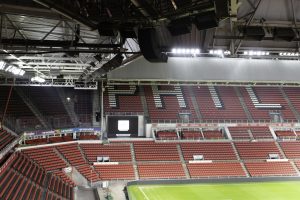Climate Change May Be a Game-Changer for Live Sound
Venue systems are becoming more robust to withstand harsher weather
Story Highlights
Weather affects everything, and, as more-sophisticated audio and video systems are installed into ever larger sports stadiums, weather — and, more specifically, more of it — is playing a part in PA-systems decisions.
In 2016, at U.S. Bank Stadium, home of the Minnesota Vikings and host of that year’s Super Bowl, exterior zinc panels started to peel away because of extreme weather; eventually, one panel was ripped entirely from the roof by high winds. The stadium, the second NFL venue to receive LEED Gold environmentally sound certification, was designed specifically for the region’s harsh winter climate and engineered to reduce snow and ice buildup. Repairing it required an additional 4,000 fasteners and took until October 2017 to finish.

Bose Professional ArenaMatch loudspeakers, which have an IP55 weather rating, are installed at the 35,000-seat Philips Stadium in Eindhoven, Netherlands.
Some systems manufacturers have been addressing inclement meteorological conditions for a number of years, weatherizing outer coverings and exposed elements of speaker cabinets. In recent years, though, a few have become more forthright about how climate change may be accelerating the way weather affects outdoor sound-system installations.
Bose Professional, for instance, emphasizes that its new ArenaMatch series loudspeakers — which had its first sports-venue installation at the 35,000-capacity Philips Stadium in Eindhoven, Netherlands, in January — achieve an IP55 weather rating via such features as a three-layer stainless-steel grille, a water-resistant woofer-cone coating, industrial polyurea exterior coating, and a molded input cover.
“We’ve had water-resistant products in the past, but it has definitely been getting wetter out there,” says Aaron Niemann, sales manager, Mid-Atlantic territory, Bose Professional. “Integrators that work on outdoor sports venues have been telling us that they want [speaker] boxes that can stand up to the elements as they become more intense.”
Rodger Von Kries, VP, Technomad, which offers lines of IP56 weatherproof speakers and waterproof sports PA systems, as well as IP66 waterproof outdoor amplifiers, said at the recent Infocomm 2019, “There’s no doubt that the demand is growing for weather-resistant and weatherproof sound systems and [related] elements. The market for that kind of product just keeps growing.”
Danley Sound Labs is a standard for point-source PA systems in college and NFL stadiums. Its speaker boxes, used at venues in harsh environments like the NFL Packers’ Lambeau Field and the Buffalo Bills’ New Era Field, use a number of weather-resistant properties, such as IP-rated wood and molded-plastic coverings.
“Those kinds of venues have another thing that can really eat away at sound systems: salt,” explains Danley President Mike Hedden. “The more snow and ice you get, the more salt finds its way into the venue and onto the systems. We build our boxes to resist that.”
A glass-polymer coating on Danley’s new Mini 180 enclosure takes that to an extreme level, but its worth was proved at Mercedes-Benz Stadium in Atlanta when a roof leak poured water directly and steadily onto it.
Sports venues are beginning to pay attention to increasingly severe weather. Initially, that’s taking the form of increased sustainability in their designs. For instance, the Atlanta Falcons’ Mercedes-Benz Stadium is the first pro-football venue in the U.S. to be awarded LEED platinum certification. The NHL’s new Greener Rinks initiative is measuring the environmental impact of 4,800 North American indoor ice rinks on their communities. And MLB awarded its annual Green Glove Award to the San Francisco Giants; the team diverts 94% of its trash from landfills.
The discussions around climate change continue to be contentious, but, as the wind and the rain and the snow continue to pound the fields and the roofs, manufacturers of the sound and video systems that have helped define this generation of sports environments are taking a closer look at how to keep those systems intact and working.
